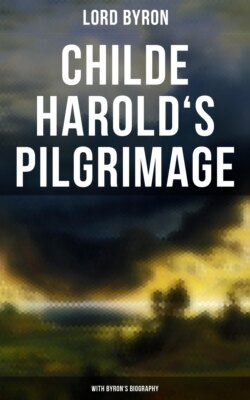Читать книгу Childe Harold's Pilgrimage (With Byron's Biography) - Lord Byron - Страница 12
На сайте Литреса книга снята с продажи.
Preface a to the First and Second Cantos.
ОглавлениеTable of Contents
The following poem was written, for the most part, amidst the scenes which it attemptsb to describe. It was begun in Albania; and the parts relative to Spain and Portugal were composed from the author's observations in those countries. Thus much it may be necessary to state for the correctness of the descriptions. The scenes attempted to be sketched are in Spain, Portugal, Epirus, Acarnania and Greece. There, for the present, the poem stops: its reception will determine whether the author may venture to conduct his readers to the capital of the East, through Ionia and Phrygia: these two cantos are merely experimental.
A fictitious character is introduced for the sake of giving some connection to the piece; which, however, makes no pretension to regularity. It has been suggested to me by friends, on whose opinions I set a high value,c—that in this fictitious character, "Childe Harold," I may incur the suspicion of having intended some real personage: this I beg leave, once for all, to disclaim—Harold is the child of imagination, for the purpose I have stated.
In some very trivial particulars, and those merely local, there might be grounds for such a notion;d but in the main points, I should hope, none whatever.e
It is almost superfluous to mention that the appellation "Childe,"2 as "Childe Waters," "Childe Childers," etc., is used as more consonant with the old structure of versification which I have adopted. The "Good Night" in the beginning of the first Canto, was suggested by Lord Maxwell's "Good Night"3 in the Border Minstrelsy, edited by Mr. Scott.
With the different poems4 which have been published on Spanish subjects, there may be found some slight coincidencef in the first part, which treats of the Peninsula, but it can only be casual; as, with the exception of a few concluding stanzas, the whole of the poem was written in the Levant.
The stanza of Spenser, according to one of our most successful poets, admits of every variety. Dr. Beattie makes the following observation:—
"Not long ago I began a poem in the style and stanza of Spenser, in which I propose to give full scope to my inclination, and be either droll or pathetic, descriptive or sentimental, tender or satirical, as the humour strikes me; for, if I mistake not, the measure which I have adopted admits equally of all these kinds of composition."5 Strengthened in my opinion by such authority, and by the example of some in the highest order of Italian poets, I shall make no apology for attempts at similar variations in the following composition;g satisfied that, if they are unsuccessful, their failure must be in the execution, rather than in the design sanctioned by the practice of Ariosto, Thomson, and Beattie.
London, February, 1812.
